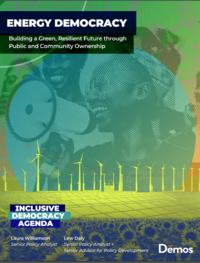Executive Summary
Energy is an integral and indispensable element of our daily lives. We deserve a say in when, where, and how the energy that fuels our lives is produced, and we should benefit from its production, especially when it happens in our communities. Yet today this vital resource is privatized and commodified beyond recognition, and the benefits of energy generation accrue to a small body of corporate and wealthy actors rather than to the communities from which energy is sourced.
Private control of energy has long served as a linchpin of structural oppression of white over Black and brown, and rich over poor. And today, it is fueling the destruction of our planet at an alarming rate. Climate change is among the most pressing issues of our time, and its devastating effects are falling disproportionately on communities of color, low-income people, and other populations who have contributed least to its onset.
Grassroots organizers in these communities are doing inspiring and transformative work to move America and the world toward a sustainable, clean energy economy. This vital, planet-saving effort presents an opportunity to make generational investments in frontline communities. It also provides an opportunity for fresh thinking about how energy is produced, moving away from monopolistic, corporate control, and toward a more democratic energy system.
In this piece, Demos lifts up that transformative organizing and creative thinking of the energy democracy movement. We make the case that ensuring just and equitable access to and ownership of one our most vital natural resources—energy—is vital to building a vibrant, inclusive democracy, and we prescribe ways to democratize our energy system, including:
- Lawmakers at all levels of government, regulators, clean energy developers, and other actors in the transition to renewable energy adopting Energy Democracy principles that center racial, social, and economic justice in the transition to renewable energy.
- States and localities transitioning from privately-owned and run utilities to public or community ownership of energy distribution and rapidly expanding distributed renewable energy infrastructure.
- States providing upfront capital for public and community-owned energy.
- States developing pricing structures for energy created in communities that build market power for community-owned energy and level the market for public and community-owned energy.
The struggle against fossil fuels and the dirty energy economy is not just one to save our planet. It is a struggle for community health, resilience, and empowerment. It is a struggle for democracy, through which we build a new, just economy that values the planet and embraces the needs of all communities.

